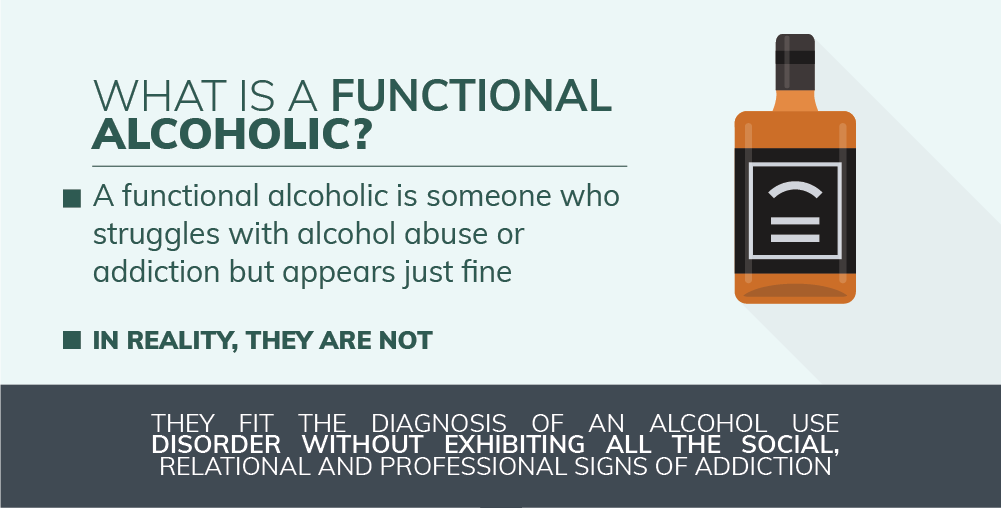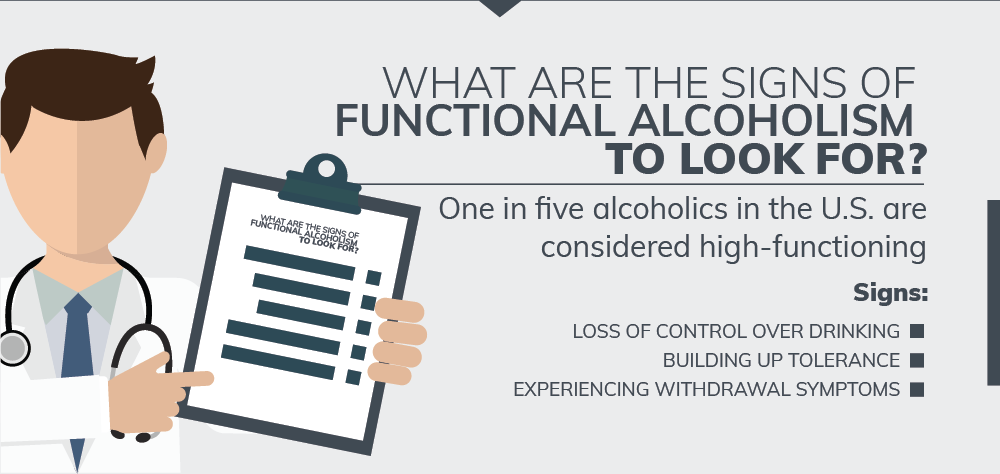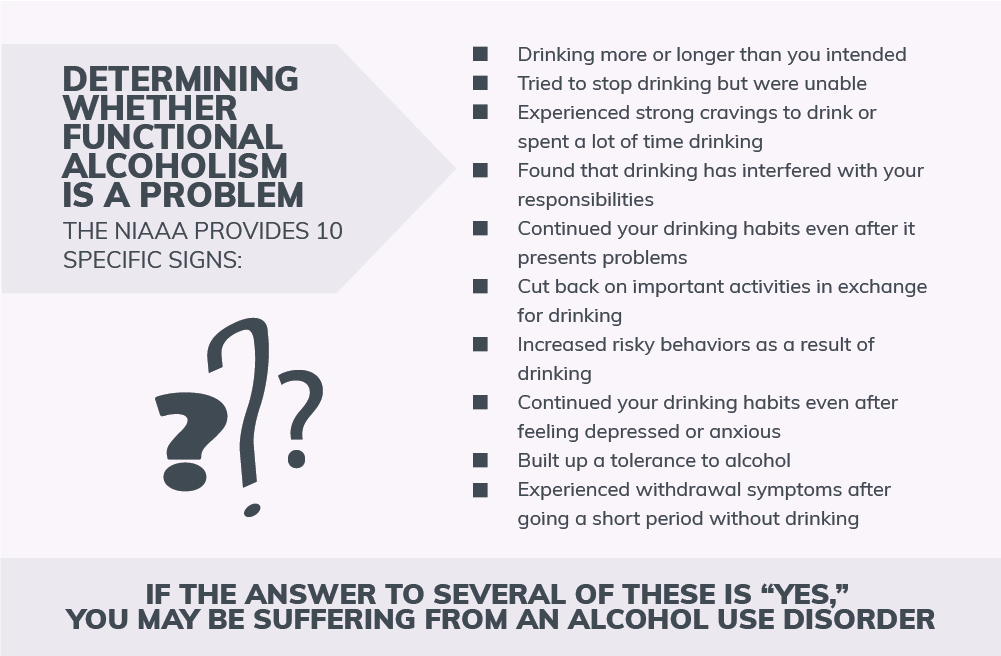Location
Our Seattle Location
Northpoint Seattle’s outpatient treatment program is located in beautiful Seattle, Washington, and we work to help the surrounding communities.
- Seattle
2111 N Northgate Way Suite 101,
Seattle, WA 98133, United States
Most people think of alcoholism as consistently having social, financial, or personal problems because of alcohol - but then what is a functional alcoholic?
Despite the misconception that alcoholism always looks a certain way, the truth is some individuals who struggle with alcohol abuse or addiction appear that they are just fine. In reality, they are far from it.
In simple terms, a functional alcoholic is someone who consistently abuses alcohol or is dependent on alcohol, even when they appear to have life completely figured out. Despite not having the outward appearance of a person struggling with the addiction, functional alcoholism can be just as dangerous to health, personal relationships, and more.
But what makes this type of alcoholism so dangerous? How common is it? How can someone know how to spot its signs before it’s too late? And how can it be treated?
This guide dives into these topics and more while showing that functional alcoholism may look safer on the surface, it can actually be just as deadly as any other type of addiction.

Now, it’s important to remember that there are many different kinds of alcoholics and drinkers in the world. And in most cases, people won’t fall so neatly into a single category. But for the sake of organization, many addiction experts lump alcoholics into one of five subtypes – and functional alcoholic is one of them.
In short, a functional alcoholic is someone that fits the clinical criteria for having an alcohol use disorder without exhibiting the various social, relational, and professional signs of alcohol addiction.
These individuals may not fit the stereotype of someone who has a problem with drinking. They may be successful in their careers, have a strong family life, a normal daily routine, and may be quite well off financially.
However, for functional alcoholics, this semblance of “normality” actually hides a severe and dangerous alcohol abuse disorder. Whether they use heavy drinking as a way to cope with the stresses of a long day (every day) or they’re hiding the abuse from their family all together, a functional alcoholic is still addicted.
And that can have some very serious, and very deadly consequences.
The hallmark of a functional alcoholic is someone who is able to maintain a productive and cohesive life while still being addicted to alcohol. As a result, it can be difficult to know what such a problem drinker looks like.
Some examples of a functional alcoholic may include:
Clearly, alcoholism does not always mean that a person's life is in shambles. Some people are able to keep their drinking a secret. The fact that someone is drinking alone or hiding their drinking habits is itself a sign of high-functioning alcoholism.
In 2007, researchers from the National Institutes of Health identified 5 alcoholic subtypes using data from nearly 1500 survey respondents with alcohol dependence. It was one of the largest and most trustworthy studies of its kind and has informed the addiction field as a whole on the nature of this type of dependency.
In this study, researchers found that most alcoholics could be categorized (mostly) as one of 5 different types: the Young Adult Subtype, the Intermediate Familial Subtype, the Young Antisocial Subtype, the Chronic Severe Subtype, and the Functional Subtype.
Below are some of the most notable characteristics of the Functional Alcoholic Subtype that researchers found in their study.
Subtype with the highest mean total family income (around $60k/yr).
Any type of substance use disorder is going to come with crippling consequences. But when it comes to functional alcoholism, the threat is even direr for one reason in particular: most people don’t know it’s a problem at all.
With functional alcoholics, it’s harder for friends and family members to recognize that they’re addicted in the first place. And that means that they’re less likely to confront their loved one about their drinking or hold an intervention.
On top of that, the addicts themselves are less likely to seek out help on their own too. A common rationalization among functional alcoholics is that since their life is stable and even successful, there’s obviously not a problem.
But despite just how deceptive this type of alcoholism is, it still holds the same far-reaching and potentially devastating risks that other types of heavy drinking have. These include physical, psychological, social, familial, financial, and legal risks.
Physical Risks
Drinking too much increases your chances of being injured or even killed. Alcohol is a factor, for example, in about 60% of fatal burn injuries, drownings, and homicides; 50% of severe trauma injuries and sexual assaults; and 40% of fatal motor vehicle crashes, suicides, and fatal falls.
- Rethinking Drinking from the National Institutes of Health
Psychological Risks
We do know that heavy drinking may have extensive and far-reaching effects on the brain, ranging from simple "slips" in memory to permanent and debilitating conditions that require lifetime custodial care.
- National Institute on Alcohol Abuse and Alcoholism
Social Risks
In terms of the broader picture, most of us – 73% of adults - have experienced some kind of adverse effect in the last year from someone else’s drinking. Of these, 5% were negatively affected in our work by a co-worker’s drinking, 16% by a relative’s or household member’s drinking, 11% by a friend’s.
- Robin Room, Director of Centre for Alcohol Policy Research via The Conversation
Familial Risks
Children of alcoholics are about four times more likely than the general population to develop alcohol problems. Children of alcoholics also have a higher risk for many other behavioral and emotional problems.
- National Institute on Alcohol Abuse and Alcoholism
Financial Risks
So how much is drinking actually costing you? If you have three drinks a day, five days a week, at an average of $10 a pop, you’re spending $150 a week, $650 a month or $7,800 a year just on alcohol ― not including any additional costs, like server tips or taking a taxi instead of driving.
- Ann Brenoff, Huffington Post
Legal Risks
Alcohol, more than any illegal drug, was found to be closely associated with violent crimes, including murder, rape, assault, child and spousal abuse. About 3 million violent crimes occur each year in which victims perceive the offender to have been drinking and statistics related to alcohol use by violent offenders generally show that about half of all homicides and assaults are committed when the offender, victim, or both have been drinking. Among violent crimes, with the exception of robberies, the offender is far more likely to have been drinking than under the influence of other drugs.
- National Council on Alcoholism and Drug Dependence, Inc.

Believe it or not, functional alcoholism and alcoholism in general are far more common than most people may think.
According to the National Survey on Drug Use and Health (NSDUH), there were around 15.1 million adults in the United States that struggle with an addiction to alcohol. Of those 15.1 million, the National Institutes of Health estimates that around 19.5% of them are functional alcoholics.
This means that one in five alcoholics may not show any obvious outward signs at all of their addiction.
On top of that, alcoholism in general is notorious for fostering a sense of denial about addiction. In fact, the NSDUH found that as many as 96.7% of alcoholics who needed treatment but didn’t receive it didn’t actually think they had a problem at all. That’s 13.5 million people who are in complete denial about their addiction!
And when you combine this inherent sense of denial with a disease that doesn’t exhibit the stereotypical signs of addiction, it means that functional alcoholics are in particular danger of going without treatment.
Given that functional alcoholism is so common, it isn’t any wonder that there have been plenty of problematic drinkers in the past that have still managed to leave their mark on history. Even still, while these figures may loom larger than life today, it was very often their own addiction to drinking that eventually led to their downfall.
Have a look at the video below for even more famous alcoholics that have made their way into history.

Knowing how to spot a functional alcoholic can be tough. After all, these individuals don’t fit the classical idea of a drug addict and, consequently may look and act like everyone else.
And while many high functioning alcoholics are good at hiding substance abuse (and even ignoring the signs themselves), there are nevertheless some symptoms to look for no matter what form alcoholism takes.
For the most part, these signs can be broken down into three categories: clinical criteria, problematic behaviors, and other visible signs.
Addiction is defined as a “chronic, relapsing brain disease that is characterized by compulsive drug seeking and use, despite harmful consequences.”
Loss of Control: One of the biggest signs of any form of alcoholism, even for high-functioning alcoholics, is the loss of control over drinking habits. A functional alcoholic may be able to hide the effects of alcohol from others, but it will be extremely difficult for them to deny themselves a drink once alcohol addiction has formed.
In fact, research has shown that the brains of addicts work in a way much different than that of a non-addict. The National Institute on Drug Abuse states:
Brain-imaging studies from people addicted to drugs show physical changes in areas of the brain that are critical for judgment, decisionmaking, learning, memory, and behavior control. Scientists believe that these changes alter the way the brain works and may help explain the compulsive and destructive behaviors of an addicted person.
A functional alcoholic, then, may want to slow down or quit entirely. But due to the changes in their brain that addiction has caused, they may be unable to do so despite all of their efforts.
Negative Consequences: One of the other hallmarks of addiction is the continued use and abuse of a drug despite negative consequences. This can be anything from having problems at home or at work to running into legal trouble.
The important point here is that an alcoholic recognizes that these negative consequences are due to their drinking but still keep doing it anyway. This might be a conscious decision, or it might be an inability to cut down or quit on their own.
Either way, sticking with drinking even after identifying that it is having a real negative impact on life is a sure sign of a serious problem.
Building Up Tolerance: Tolerance is defined as needing to take a higher dose of a drug in order to achieve the same level of response achieved initially. Essentially, it’s the result of the body becoming more and more used to a drug being in the system.
And when that happens with alcohol, it takes more booze to get the body drunk.
While tolerance is thought of by many as a sign of “manliness” or “willpower,” it’s actually just a sign that drinking has become a serious, physical problem.
Experiencing Withdrawal: A physical dependence on alcohol means the body has become both used to and dependent on alcohol being in the bloodstream.
And when it’s been a long time since the last drink, someone dependent on alcohol can experience what are known as withdrawals.
A functional alcoholic will experience uncomfortable withdrawal symptoms after about 8 to 12 hours of not having any alcohol at all. These symptoms will last longer and look worse the longer that alcoholism has been a problem for the individual.
While the clinical criteria for alcoholism is a great starting point, sometimes it’s more helpful to recognize certain behaviors instead of just the broad categories talked about above.
Below are some of the most common behavioral signs of a drinking problem, even as a functional alcoholic.
Behaviors are one thing, but what are some physical signs of a functioning alcoholic to be on the lookout for?
Below are some of the most notable.
So far, we already know what functional alcoholism is and what it looks like to be a functional alcoholic. The next question to address is how can one determine whether or not functional alcoholism is a problem either in their own life or in the life of someone they know and love.
While there is no precise test to take online for a diagnosis, there are a couple of ways of determining whether or not alcoholism is an issue - or at least put someone on track to getting the professional help that they need.
The National Institute on Drug Abuse (NIDA) provides the DSM-V’s criteria for diagnosing a substance use disorder. These criteria involve eleven specific questions to ask when it comes to examining alcohol addiction.
If the answer to at least two of these questions is yes over the period of the last 12 months, it may be indicative of an alcohol use disorder - which includes high-functioning alcoholism. A high functioning alcoholic may exhibit many of the same signs of this disorder, but learn to hide the symptoms from friends and family.
An adapted list of the questions is as follows:
NIDA’s Self-Assessment Tools – The National Institute on Drug Abuse itself also offers a variety of tools, assessments, and questionnaires that individuals and professionals alike can use to determine the severity of an addiction.
These tests range from simple 4-question quizzes all the way to more intensive assessments that take a much deeper dive into the nature of someone’s addiction. Ultimately, whether someone only has a few minutes to spare or wants to get the most complete information available, this collection of tools has it all.
Ask A Professional – And last but not least, questioning individuals can get in contact with an actual addiction expert to get their professional opinion on whether or not they’re really an alcoholic.
This can involve making an appointment with a practicing physician, finding a psychiatrist, or even just calling an addiction treatment center for a free addiction assessment. These calls are usually obligation-free, completely confidential, and don’t take more than around 20 to 30 minutes to complete. Plus family members or friends can call about people they’re concerned about too.
Either way, a personalized assessment provides a fully-individualized experience where patients can ask questions, get clarification, and learn more about functional alcoholism and addiction in general. It’s the final step before seeking out treatment – and it’s also one of the most important.

Once a functional alcoholic has finally reached a tipping point or has been convinced by friends and family to seek help, it’s time to pick out a treatment program. But what kind of program should a functional alcoholic choose? What options are available? And what are the pros and cons of each?
In general, there are four main treatment types for functional alcoholics to choose from: inpatient treatment, outpatient treatment, intensive outpatient treatment, and support groups.
Before checking into any of these programs, however, any type of alcoholic should undergo professional alcohol detoxification. Detox allows alcoholics to get through the often-unbearable symptoms of alcohol withdrawal safely and comfortably.
And since alcohol is one of the only drugs with deadly withdrawals, it's a step that's not only crucial for recovery, but it can actually end up being a lifesaver as well.
Considered by many to be the “gold standard” for treating addictions of all kinds, inpatient treatment allows patients to focus 100% on their recovery without having to deal with the distractions of the outside world.
During these programs, patients are usually confined to the program campus, sometimes only being able to leave if escorted by a chaperone.
There are a few obvious benefits to this type of program.
However, the tradeoff here is that inpatient programs usually require complete isolation from outside obligations for the length of the program (about 30 days). And that can make it difficult, if not impossible, to maintain a career, further education, or even attend to certain familial needs (though visitors are often allowed).
And as a functional alcoholic whose life is still full of such obligations, inpatient may not necessarily be the best choice for treatment depending on the situation.
The far more flexible option when it comes to treatment, outpatient programs let patients go about their day normally. They can go to their job, attend classes, pick up their kids from school, and pretty much live life just as they had before (without the drinking of course).
Several times a week, though, patients will attend evening treatment sessions where they’ll undergo counseling, group talk, and behavioral therapy sessions just like they would in an inpatient program.
These sessions will usually last for a few hours and may occur one to three times a week, depending on the program.
The benefit here is obviously a less rigid structure. These programs also tend to last several months at a time too. And last but not least, they’re usually quite a bit more affordable than inpatient programs as well – a welcome benefit to be sure.
Also known as intensive outpatient programs or IOPs, this type of rehabilitation is a step up from outpatient treatment without requiring patients to actually stay within campus grounds at all times like inpatient.
An IOP allows recovering functional alcoholics to attend to their daily obligations outside of treatment while getting treatment from evening sessions during the week – just like outpatient. However, sessions are usually longer and tend to happen more frequently as well.
For high-functioning alcoholics with a particularly severe or lengthy addiction, this is a fantastic choice for treatment in that it offers both flexibility and a high level of care.
Finally, functional alcoholics may also attend support groups outside of professional treatment programs. While these groups typically don’t offer the same level of treatment as a proper addiction facility (or the medical and professional expertise), they can be somewhat helpful on their own.
Programs like Alcoholics Anonymous (a 12-step meeting group), Secular Organizations for Sobriety, and SMART Recovery are just a few of the most popular support groups to choose from.
There are also plenty of online support programs that allow recovering addicts to tell their story and learn from others without ever having to leave home.
It’s important to note, however, that the most effective means of recovery is by combining support groups like these with a professional treatment program. And since functional alcoholism treatment can be dangerous in some cases, finding a trustworthy addiction facility is highly recommended.

Although functional alcoholics may not show the typical signs of having a substance use disorder, they are still subject to the very real dangers that come with alcoholism. Getting hooked on this widespread and deadly substance can cause a vast array of physical and psychological effects that can seep into nearly every aspect of someone’s life.
And for functional alcoholics, the threat is even direr simply because this form of addiction often goes entirely unnoticed – even though as many as 1 in 5 alcohol addicts are actually functional alcoholics.
Thankfully, there are still ways of determining whether you or a loved one are suffering from this deceptive but dangerous type of addiction. And once you’ve identified the presence of alcoholism, there are plenty of options to help overcome it.
At Northpoint Seattle, we offer the best IOP center in the area. Our nationally accredited program follows only the highest standards in treating nearly any kind of addiction including functional alcoholism. With individualized care that’s tailored to meet each patient’s specific needs, our professional physicians, nurses, and staff are dedicated to one thing and one thing only – helping people take back their lives from addiction.
You don’t have to live like a slave to alcoholism. And even if it is “functional,” it can still be deadly.
Recovery is possible. And at Northpoint Seattle, we’d love to help.
If you think you may be a functional alcoholic, be honest with yourself and get the help that you need to recover from alcoholism, no matter what form it takes.

Our admissions coordinators are here to help you get started with treatment the right way. They'll verify your health insurance, help set up travel arrangements, and make sure your transition into treatment is smooth and hassle-free.
888.483.6031Contact Us